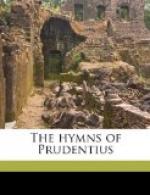69 For the incident referred to in these lines,
see the Apocryphal
book of Tobias, cc.
ii. and xi. Tobit, a pious Israelite captive
in Nineveh, was reduced
to beggary as the result of his zeal in
burying those of his
countrymen who had been killed and exposed by
royal command.
He also lost his sight, which was eventually restored
by the application of
the gall of a fish which attacked his son
Tobias, and was killed
by him. The “fish” of the legend is
probably
the crocodile, whose
gall was credited with medicinal properties by
various Greek and Latin
writers. Cf. Pliny, N. H. xxviii.
8: “They
say that nothing avails
more against cataract than to anoint the eyes
with its gall mixed
with honey.”
113 Cf. Cyprian (De Mortal. 20):
“We must not lament our brethren
whom the Lord’s
summons has freed from the world, for we know that
they are not lost, but
gone before. We may not wear the black robes
of mourning while they
have put on the white raiment of joy. Nor
may we grieve for those
as lost whom we know to be living with God.”
171 Cf. Perist. vii.:—
“Nos
pio fletu, date, perluamus
Marmorum
sulcos.”
The early Christian epitaphs, of which many thousands exist, are instinct with a faith which is in striking contrast to the unrelieved gloom or sullen resignation of paganism. We may compare with the common
AVE ATQVE VALE
“Hail and farewell”
or inscriptions like
INFANTI DVLCISSIMO QVEM DI IRATI AETERNO SOMNO DEDERUNT
“To a very sweet babe,
whom the angry gods gave to unending
sleep.”
the Christian
DVLCIS ET INNOCENS HIC DORMIT
SEVERIANVS SOMNO PACIS CVIVS
SPIRITVS IN LVCE DOMINI SVSCEPTVS EST (A.D.
393)
“Here slumbers in the
sleep of peace the sweet and innocent
Severianus, whose spirit is received in the
light of the Lord”
or
NATVS EST LAVRENTIVS IN ETERNVM ANN. XX. DORMIT IN PACE (A.D. 329)
“Laurentius was born
into eternity in his twentieth year. He
sleeps in peace.”
See also note on iii. 205.
XI
1 Virgil’s Fourth Eclogue known as the “Pollio”
has undoubtedly
influenced the thought
and style of this poem: the more noticeable
parallels will be pointed
out as they occur. In Milton’s ode On
the Morning of Christ’s
Nativity there are several passages which
recall Prudentius’
treatment of the theme in this and the succeeding
hymn; but curiously
enough, the Puritan poet in alluding to the
season of the Nativity
takes an opposite line of thought, and
regards the diminished
sunshine of winter as a veiling of an inferior




